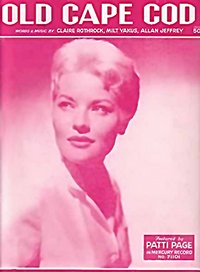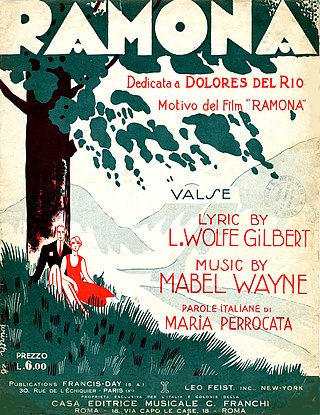Related Research Articles

Ruby Florence Murray was a Northern Irish singer. One of the most popular singers in the British Isles in the 1950s, she scored ten hits in the UK Singles Chart between 1954 and 1959. She also made pop chart history in March 1955 by having five hits in the Top Twenty in a single week.

"Secret Love" is a song composed by Sammy Fain (music) and Paul Francis Webster (lyrics) for Calamity Jane, a 1953 musical film in which it was introduced by Doris Day in the title role. Ranked as a number 1 hit for Day on both the Billboard and Cash Box, the song also afforded Day a number 1 hit in the UK. "Secret Love" has subsequently been recorded by a wide range of artists, becoming a C&W hit firstly for Slim Whitman and later for Freddy Fender, with the song also becoming an R&B hit for Billy Stewart, whose version also reached the top 40 as did Freddy Fender's. In the UK, "Secret Love" would become the career record of Kathy Kirby via her 1963 remake of the song. The melody bears a slight resemblance to the opening theme of Schubert's A-major piano sonata, D.664.
"Around the World" is the theme tune from the 1956 movie Around the World in 80 Days. In the film, only an instrumental version of the song appeared, although the vocal version has become the better known one. The song was written by Harold Adamson and Victor Young; Young died in 1956, several weeks after the film's release, and he received the Academy Award for Best Music, Scoring of a Dramatic or Comedy Picture posthumously. Young's orchestral version was a #13 hit on the Billboard charts in 1957. The recording by Bing Crosby was the B-side of the Victor Young version in 1957, on Festival SP45-1274 in Australia, and was a joint charting success.
"You Always Hurt the One You Love" is a pop standard with lyrics by Allan Roberts and music by Doris Fisher. First recorded by the Mills Brothers, whose recording reached the top of the Billboard charts in 1944, it was also a hit for Sammy Kaye in 1945.
"Hearts of Stone" is an American R&B song. It was written by Eddie Ray and Rudy Jackson, members of the San Bernardino, California-based rhythm and blues vocal group the Jewels which first recorded it for the R&B label in 1954. The Jewels began as a gospel group, then became the Marbles, recording for the Lucky label out of Los Angeles. According to Johnny Torrence, leader of the Marbles/Jewels, it was taken from a song they recorded in their gospel days.
"Let Me Go, Lover!", a popular song, was written by Jenny Lou Carson and Al Hill, a pen name used by Fred Wise, Kathleen Twomey, and Ben Weisman. It is based on an earlier song called "Let Me Go, Devil", about alcoholism.
"Thinking of You" is a popular song, composed by Harry Ruby with lyrics by Bert Kalmar. It was introduced in the Broadway show, The Five O'Clock Girl (1927) when it was sung by Mary Eaton and Oscar Shaw.

"Old Cape Cod" is a song written by Claire Rothrock, Milton Yakus and Allan Jeffrey that was published in 1957. The single, as recorded by Patti Page, became a gold record, having sold more than a million copies. Hailed by Cape Cod natives as the "unofficial Cape Cod Anthem, if ever there was one," the song has been credited with "putting the Cape on the map" and helping to establish Cape Cod as a major tourist destination.
"You Can't Be True, Dear" is a popular German song.

"Vaya con Dios (May God Be With You)" (, literally "Go with God") is a popular song written by Larry Russell, Inez James, and Buddy Pepper, and first recorded by Anita O'Day in December 1952. Les Paul and Mary Ford had a No. 1 recording of the song in 1953. Members of the Western Writers of America chose it as one of the Top 100 Western songs of all time.
"Nevertheless I'm in Love with You" is a popular song written by Harry Ruby with lyrics by Bert Kalmar, first published in 1931. The song was a hit for Jack Denny in 1931, and was revisited in 1950 by The Mills Brothers, Paul Weston, Ray Anthony, Ralph Flanagan, Frankie Laine and Frank Sinatra, with perhaps the most compelling version being that of the McGuire Sisters.

"Who's Sorry Now?" is a popular song with music written by Ted Snyder and lyrics by Bert Kalmar and Harry Ruby. It was published in 1923, when Isham Jones had a major hit with it. Other popular versions in 1923 were by Marion Harris, Original Memphis Five, Lewis James, and Irving Kaufman.
"Have I Told You Lately That I Love You?" is a popular song written by Scotty Wiseman for the 1944 musical film, Sing, Neighbor, Sing and performed by Lulu Belle and Scotty. It was their greatest hit and one of the first country music songs to attract major attention in the pop music field. Although the song was featured in the movie, it was not released by Lulu Belle and Scotty until 1947. The first released version of this song was by Gene Autry in 1945.

"Melody of Love" is a popular song. The music was originally written by Hans Engelmann in 1903. The lyrics were added by Tom Glazer in 1954.
"I'll Get By (As Long as I Have You)" is a popular song with music by Fred E. Ahlert and lyrics by Roy Turk. The song was published in 1928. Versions by Nick Lucas, Aileen Stanley and, most successfully, Ruth Etting, all charted in America in 1929.
"Ruby Baby" is a song written by Jerry Leiber and Mike Stoller. It was originally recorded by the Drifters. Their version was released as a single by Atlantic Records in 1956. It peaked at No. 10 on the US Hot R&B chart.
"Someday You'll Want Me to Want You" is a popular song published in 1944 by Jimmie Hodges. The song became a standard, recorded by many pop and country music singers.

"Ramona" is a 1928 song, with lyrics written by L. Wolfe Gilbert and music by Mabel Wayne. Composed for the 1928 feature film Ramona, it was the first theme song ever written for the movies.
"Fallin'" is a song written by Neil Sedaka and Howard Greenfield, that was recorded by Connie Francis on 2 September 1958 at Metropolitan Studio (NYC) in a session produced by Morton "Morty" Kraft who also conducted.
"Jealous Heart" is a classic C&W song written by American country music singer-songwriter Jenny Lou Carson. In the mid 1940s it spent nearly six months on the Country & Western charts. It was subsequently recorded by several pop singers.
References
- ↑ "Song: Happy Days and Lonely Nights written by Fred Fisher, Billy Rose | SecondHandSongs". SecondHandSongs.
- ↑ Whitburn, Joel (1986). Joel Whitburn's Pop Memories 1890-1954. Menomonee Falls, Wisconsin: Record Research Inc. p. 506. ISBN 0-89820-083-0.
- 1 2 "HAPPY DAYS AND LONELY NIGHTS - Lyrics - International Lyrics Playground". Lyricsplayground.com. 2007-10-10. Retrieved 2016-08-22.
- ↑ "Artists - Ruth Etting". Songwriters Hall of Fame. Archived from the original on 2009-09-09. Retrieved 2016-08-22.
- ↑ "Classic UK 45s". 45-rpm.org.uk. 2015-01-25. Retrieved 2016-08-22.
- ↑ "The Official Charts Company - Search for: happy days and lonely nights". Archive.is. 2012-07-29. Retrieved 2016-08-22.
- ↑ "Praguefrank's Country Music Discographies: Connie Francis - part I". Countrydiscography.blogspot.com. 2009-05-13. Retrieved 2016-08-22.
- ↑ "Popmusicinfo". Popmusicinfo.com. Retrieved 2016-08-22.